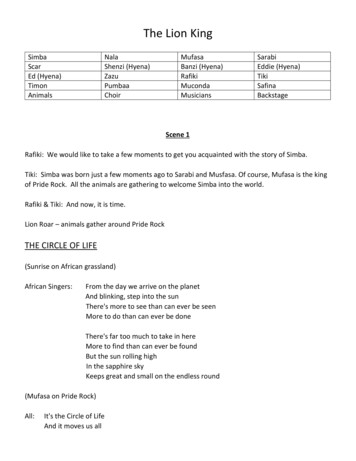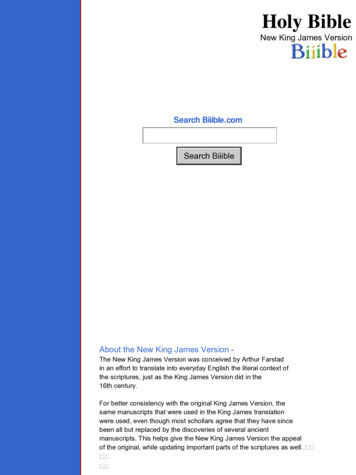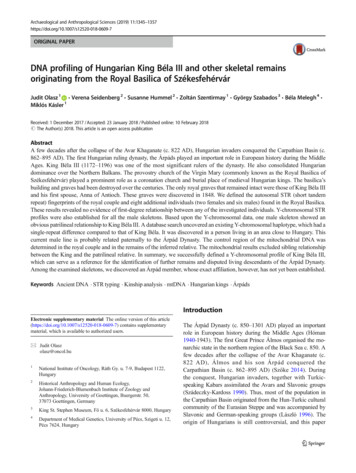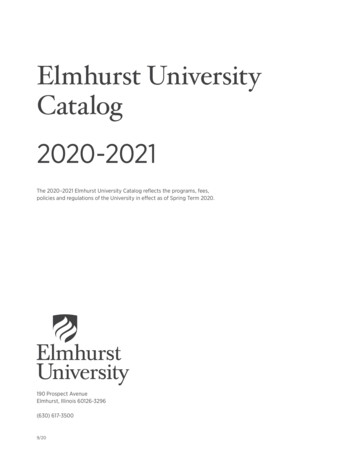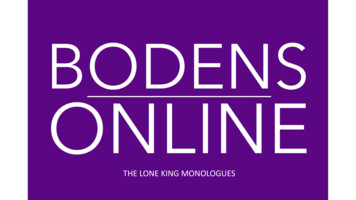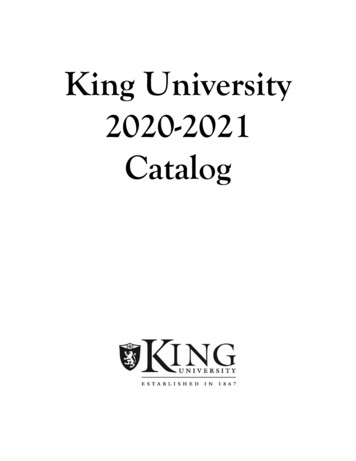
Transcription
King University2020-2021Catalog
TITLE PAGEKing University offers programs that lead to the following degrees: Associate of Arts, Bachelorof Arts, Bachelor of Business Administration, Bachelor of Science, Bachelor of Science in Nursing,Bachelor of Social Work, Master of Business Administration, Master of Education, Master ofScience in Nursing, and Doctor of Nursing Practice.King is accredited by the Southern Association of Colleges and Schools Commission onColleges (SACSCOC) to award associate, baccalaureate, master, and doctoral degrees. Contact theCommission on Colleges at 1866 Southern Lane, Decatur, Georgia 30033-4097, or call 404-6794500 for questions about the accreditation of King. The SACSCOC web site is www.sacscoc.org.King University is certified to operate in Virginia by the State Council of Higher Education forVirginia. King’s primary location in Virginia is Southwest Virginia Community College, 724Community College Road, Cedar Bluff, Virginia 24609. Each course or degree or certificateprogram offered by King University in Virginia is approved by King or its Board of Trustees (whenapplicable).The teacher education programs are approved by the Tennessee State Board of Education. TheSchool of Nursing programs are fully approved by the Tennessee Board of Nursing and aremembers of the American Association of Colleges of Nursing. The Baccalaureate degree programin Nursing, Master's degree program in Nursing, and the Doctor of Nursing Practice program atKing University are accredited by the Commission on Collegiate Nursing Education,(http://www.ccneaccreditation). The Bachelor of Social Work program is accredited through theCouncil on Social Work Education (CSWE). The athletic program is a member of the NationalCollegiate Athletic Association (NCAA) Division II and Conference Carolinas.King is a member of the Tennessee College Association, the Tennessee Independent Collegesand Universities Association, the Tennessee Fund for Independent Colleges, the TennesseeAssociation of Colleges for Teacher Education, the Tennessee Association of Independent LiberalArts Colleges for Teacher Education, the Appalachian College Association, the Holston AssociatedLibraries, the Council for Independent Colleges, the National Association of Independent Collegesand Universities, the Association of Presbyterian Colleges and Universities, the Council forChristian Colleges and Universities, the Association of American Colleges and Universities, theNational Association of Christian Social Workers (NACSW), and the National Association ofSocial Workers (NASW).King University does not discriminate on the basis of race, color, national origin, sex, disability,or age in its programs and activities. The following person has been designated to handle inquiriesregarding King's non-discrimination policies: James P. Donahue, Vice President for Administrationand Finance and Title IX Coordinator, 1350 King College Road, King Building, Bristol, Tennessee37620, phone 423-968-1187.The institutional policies and academic regulations described in the King University Catalog represent the most current informationavailable at the time of publication or the academic year indicated on the cover. The institution may elect, however, to make changes inthe curriculum regulations or other aspects of this program. Thus, the provisions of this catalog are not to be regarded as an irrevocablecontract between the institution and the student.
Table of ContentsThe Mission and Vision of King .1History of King University .4Campus/Instructional Site Locations .7Alumni . 10PoliciesAdmissions Policies . 11 Academic Preparation . 11Admissions . 11Advanced Standing . 11Application Packet Requirements forGraduate Programs . 12Application Packet Requirements forUndergraduate AGS Programs . 16Applying as a New Freshman . 17Applying as a Transfer Student . 17Applying for Readmission to King . 19Dual Enrollment Students . 20International Students. 21Part-Time Students . 21Financial Information . 22 AGS/Online Student Cost Structure . 22 Additional and Part-Time Fees . 22 Full-Time Traditional Student CostStructure . 25 General Financial Information . 25 Military Mobilization . 26 Payment of Student Accounts . 28 Refunds . 28 Veterans Affairs (VA) Educational Benefits . 31 Withdrawal from a Course or Dropa Course . 34 Withdrawal from the Institution . 35Financial Aid . 37 Application for Financial Aid . 37Sources of Financial Aid . 37General Facts . 37Financial Aid General Policies . 38Title IV Federal and King InstitutionalSatisfactory Academic Progress . 39Appeals . 42Appeal Deadline for Submission . 42Additional Information . 42Qualitative Standards . 43Quantitative Standards . 43Student Life . 45 Student Affairs . 45Honor Code . 47Complaint Procedure . 47Inclement Weather and EmergencyClosure . 48 Annual Security Report . 48 Title IX. 48Academic Policies . 49 Adult and Graduate Studies (AGS)Courses for Traditional Students . 49 Academic Amnesty . 49 Academic Appeals . 49 Academic Standing . 50 Audits . 52 Awarding Posthumous Degrees . 52 Change of Grades . 53 Chapel, Convocation, and Service (CCS)Credit—Traditional. 53 Class Attendance . 54 Classification of Students . 54 Completing an Additional Major orAdditional Degree After Earning aBachelor’s Degree . 54 Comprehensive Assessment of GeneralEducation . 55 Comprehensive Assessment of Major . 55 Counting Courses for More than OneRequirement. 55 Course Substitution . 56 Declaration of Major . 56 Declaration of Minor, Track, orConcentration . 56 Declaration of Credit Hour andEquivalencies . 57 Degrees Offered . 57 Directed Studies . 58 Final Examinations . 58 Grade Requirements in the Major andMinor . 59 Grading: Grade Reports and the QualityPoint System . 59 Graduation Requirements . 60 Honors in Independent Study . 61 Intent to Graduate . 61 International Baccalaureate (IB) Program . 61 Internship Policy . 61 KING Courses . 63 Last Day to Add a Class . 63 Late Arrival . 63 Leave of Absence . 63 Limitation of Hours . 64 Limitation of Physical Education ActivityCourses . 64 Online and Distance Education—StudentPrivacy . 64 Online Education . 64 Orientation and Advising . 65 Participation in Commencement Exercises . 65 Pass/Fail - Undergraduate Courses . 65
Table of ContentsPlacement for Composition Courses . 66 Prior Learning Assessment (PLA) . 66 Program Length . 68 Records and Transcripts . 68 Registration and Changes in Class orSchedule . 68 Repeat Coursework . 69 Special Topics Courses . 69 Student Course Evaluations . 69 Summer Term—Traditional . 69 Taking Courses at Other Institutions . 69 Time Limit for Completion of DegreeRequirements . 70 Transfer Credit Acceptance . 70 Transfer of King University Credits toOther Institutions . 71 Undergraduate Academic Honors . 71 University President’s and Provost’s Lists. 71Programs and Services . 72 The R.T.L. Liston Medallion forAcademic Excellence . 72 Adult and Graduate Studies (AGS) . 72 Academic Center for Excellence (ACE) . 73 King University Libraries. 73 Information Technology . 74 Jack E. Snider Honors Program—Traditional . 74 King Institute for Faith and Culture . 74 Army Reserve Officer Training Corps(ROTC) Military Science . 76 Dual Enrollment . 77 Au Sable Institute of EnvironmentalStudies . 78Preparation for Pre-Professional Programs . 85 Pre-Professional Programs . 85General Education . 87Academic Programs—Majors and Minors . 94Undergraduate Programs . 96Associate of Arts . 96Applied Science and Mathematics . 97Biblical Studies . 99Biochemistry . 99Biology . 100Business . 106Business Administration BBA . 109Chemistry . 110Coaching . 112Communication . 113Criminal Justice. 114Digital Media Art and Design. 118Economics . 119English . 120English as a Second Language (ESL)for Grades PreK-12 . 124(minor and post-baccalaureate options)Exercise Science . 125Forensic Science. 128Health Humanities . 129Health Informatics. 130Healthcare Administration . 131History . 133Information Technology . 136Intercultural Studies . 138Interdisciplinary Studies(Elementary Education) . 138Leadership . 143Mathematics . 144Multidisciplinary Studies . 147Music . 147Nursing BSN . 151Nursing RN-BSN . 155Philosophy. 158Physics . 159Political Science/History . 162Psychology . 164Religious Studies. 166Secondary Education . 169Security and Intelligence Studies . 171Social Work . 172Spanish . 176Sport Management . 177Teacher Education. 179Theatre . 182Youth Ministry . 183Graduate Programs.185Business . 185Education . 190Nursing MSN . 192Nursing DNP . 197Post-Graduate Certificate .200Family Nurse Practitioner . 200Nurse Educator . 200Psychiatric Mental Health Nurse Practitioner . 201Course Descriptions .203Academic Structure .293Staff and Faulty .295Academic Calendar .307
The Mission and Vision of King UniversityPHILOSOPHY OF EDUCATIONA King education is one that values excellentteaching, high expectations, worthwhile example, andfidelity to our Presbyterian heritage in keeping withthe mission and identity of the institution. Thiseducation seeks to provide opportunities for studentsto become competent in their chosen fields of study,to grow toward maturity in their understanding ofChristian faith, and to make personal commitmentsfor responsible service and stewardship in the world.It maintains high academic standards whilesupporting the development of skills essential forsuccess in a rigorous academic program.MISSIONWe prepare students in our Christian academiccommunity to excel as thoughtful, resourceful, andresponsible citizens with a passion for serving God,the Church, and the world.We accomplish this through excellent teaching, highexpectations, worthwhile example, and fidelity to ourPresbyterian heritage. Our mission is the same for allcampuses, sites and online, and for all programs—curricular and extracurricular, graduate andundergraduate.VISIONThe King General Education, or Core Curriculum, isthe academic foundation for the King experience. Itgives all students the skills, ideas, and knowledge theyneed to pursue their major and minor programs withconfidence and good judgment. Through generaleducation, King seeks to develop a student’sintellectual and practical skills, create anunderstanding of human culture and the natural andphysical world, foster an appreciation for humancreative products, and create an awareness ofthoughtful, resourceful, and responsible citizenship.We aim to be the preeminent small to medium-sizedChristian university in the Upper South, with areputation earned there and beyond as a schoolserious about its Christian commitment, focused onstudent success, dedicated to academic excellence,and successful in producing graduates who excelwherever they live, work, and serve.IDENTITYKing is a Christian university in the Presbyterian andReformed traditions with the core belief that becauseGod is the Creator, Sustainer, and Redeemer of alllife, our knowledge of self, the world, and God areinterrelated. As the reformer John Calvin affirms inthe opening words of the Institutes of the ChristianReligion, “Nearly all the wisdom we possess, that is tosay, true and sound wisdom consists of two parts: theknowledge of God and of ourselves.” A Christianeducation, thus, is one that integrates faith, learning,and life.Teaching and learning expectations should recognizethe variability of student talent, background, andpreparation. Consequently, the King education iscommitted to providing personal attention, meaningthat all educators—faculty and staff—seek tounderstand the needs of students and to be accessibleand available to them while striving to provide anenvironment that encourages social, spiritual, andacademic maturity. Furthermore, the institution isconcerned for the balanced growth of the individual,recognizing that intellectual learning does not takeplace in isolation from other aspects of personaldevelopment and affirming the role of all members ofthe King community in the teaching and learningprocess.The purpose of the vigorous and broad education atKing is to educate students so that they may excel asthoughtful, resourceful, and responsible citizens witha passion for serving God, the Church, and theworld. By excelling in our chosen fields of study andlater in vocations and careers, we respond to thedivine calling of using God-given talents and abilitiesto their full potential.King holds that knowledge of self, the world, andGod are connected and, therefore, that learning andintellectual inquiry are acts of worship. King seeks tomaintain an atmosphere in which learners have theprivilege and responsibility of exploring the full rangeof questions raised in and beyond the classroom. Theinstitution seeks to foster an ethos that stresses theimportance of exploration, personal initiative,King positions itself as a missional university thatprepares students to engage the world and nurturesstudents in vital Christian faith, rather than as auniversity with an inward focus that attempts toprotect and separate students from the larger cultureand world.1
The Mission and Vision of King Universitycharacter and integrity, collegiality, humane instincts,aesthetic sensitivities, and leadership. The communityof learners at the institution seeks to embrace thevalues of Christian community through lives ofscholarship, service, and spiritual formation.and integrity, justice and peace, vocation and calling,and an integrated world and life view.The goal of spiritual formation at King is to developeach student’s character so that the individual mayexcel as a thoughtful, resourceful, and responsiblecitizen with a passion for serving God, the Church,and the world. The institution stresses praxis as wellas intellectual achievement, for it is understood thatthe “mind of Christ” is about both the love of Godand the love of neighbor. If we do not love ourneighbor, whom we can see, in just and beneficentways, we cannot honestly say that we love God, whomwe cannot see.SPIRITUAL FORMATION“LET THE SAME MIND BE IN YOU THAT WAS INCHRIST JESUS.” (PHILIPPIANS 2:5)“Let this, then, be the first step, to abandonourselves, and devote the whole energy of our mindsto the service of God.” –John CalvinThe philosophy of education at King states that as acommunity of learners we seek “to embrace the valuesof Christian community through lives of scholarship,service, and spiritual formation.” As a result, a Kingeducation seeks to integrate faith, learning, and life inkeeping with the mission and vision of theinstitution.Although the institution has core values that aredistinctly Christian, we have historically been open toall students of quality regardless of their religiouspersuasions. We serve students from the varioussegments of the Christian family, both Protestant andCatholic, but also students from other religions orfrom secular perspectives. Our mission and vision isto serve all students and assist them in their spiritualformation, encouraging their spiritual growth andcharacter development toward the truly good, wise,just, and beneficent.In general, spiritual formation is the process of thehuman spirit taking on a definite form or character.Regardless of a secular or religious orientation, allpersons ultimately are engaged in a process ofspiritual formation that shapes character in thedepths of their beings. Such a process can be negativeor positive, destructive or beneficial. In the context ofa university, however, the process of spiritualformation should be one that helps shape the humanspirit toward the truly good, wise, just, andbeneficent.Spiritual formation will be reviewed by the student’sparticipation in and evaluation of the followingactivities: Regular academic offerings Service and mission projects Traditional spiritual disciplines such asworship, service, prayer, and study Cross-cultural and study-abroad programs.For a university whose core values are Christian, theprocess of spiritual formation should shape thecharacter of each student toward the truly good, wise,just, and beneficent, and be reflective of the personand work of Jesus Christ. This will be done best asthe institution draws on its vast resources ofcurricula, extracurricular programs, service andmission projects, administrative policies, andcommunity life in such a way that they promote theprocess of character formation in the direction offaithful, prudential, paradigms, and domains.Because true education is about the whole person—body, mind, and spirit—the institution facilitates notonly study and scholarship, but also reflection andprayer, service and worship, virtue and ethics, honorCOMMITMENTSWe affirm the Reformed understanding of a worldcreated good by God, distorted by sin, redeemed inJesus Christ, and awaiting the fullness of God’s reign.We profess the authority of Holy Scripture as theWord of God and uphold the historic witness of theecumenical creeds of the Christian Church. We aimto maintain a Christian academic communitycharacterized by mercy, justice, and integrity thatincludes corporate worship, Bible study, Christianfellowship, mission outreach, prayer, and pastoralcare. We commit to hiring faculty, administrators,and staff of superior competence and mature2
The Mission and Vision of King UniversityChristian faith. We require that all trustees bewomen and men who have excelled in their vocationsand who give evidence of their Christian faith uponselection to the board.CONTEXTKing was founded in 1867 by Presbyterians whoresolved to create a college of “such high order as willgreatly elevate the standard of classical and scientificinstruction in East Tennessee.” King is anindependently governed institution with covenantaffiliations to the Presbyterian Church (USA) and theEvangelical Presbyterian Church.Consistent with its historic motto Ecclesiae et Litteris,for the church and for learning, the Christiancharacter of the institution is expressed in a programintentionally built on a foundation of the classicPresbyterian tradition, the authority of Scripture, andpersonal commitment to Jesus and His service.The institution is committed to a regional, national,and international constituency. King strives to enrichthe collegiate experience and broaden its service byhaving an ethnically and geographically diversestudent body. Applicants are accepted into theinstitution upon evidence of academic qualificationsand are admitted without regard for ethnic orreligious background.3
History of King UniversityKing University came into being as a result of theupheavals of the Civil War in Southern Appalachia.Because of the sharp divisions between Union andsecessionist ideologies, Presbyterians who hadsupported the Confederate cause found themselveswithout a church-related college in their regionfollowing the conflict.model of the liberal arts set forth by Yale. Courseofferings were limited to Latin, Greek, mathematics,and science. Tadlock maintained close personalrelationships with his students and encouraged theformation of student-led literary societies in whichthe students honed their skills in public speaking anddebate.Zeal for higher education has long been a hallmark inthe Reformed churches. Because they supported thattradition, the post-war leaders of the HolstonPresbytery in Northeast Tennessee decided toestablish a college. Though conditions were difficultin the post-Civil War South, the Presbytery’sstatement was clear. On April 9, 1866, the minutesnote: “The presbytery is deeply impressed not onlywith the importance of establishing a classical school,but one of such high order as will greatly elevate thestandard of classical and scientific instruction in EastTennessee, and which with such instruction, willcombine that strict discipline and the thoroughreligious training that will fully develop the moral aswell as the intellectual man.”During the 18 years of his presidency, Tadlockproduced only 63 graduates, but they were animpressive group. From this number there were 40ministers, seven of whom were missionaries. Tenbecame lawyers; another ten were college professors,five becoming college presidents; three were editors ofmagazines and newspapers; and others went intobusiness. More than seventy percent of Tadlock’salumni had graduate or professional training, andhalf were recipients of honorary degrees. Eight hadnational careers of such prominence that they werechosen for inclusion in Who’s Who in America.One graduate wrote later of his beloved president,“We were proud of him. The sacrifices we knew hewas making to remain with the little college endearedhim to us, and the fact that we had such a presidentmade every man of us feel that King ranked anycollege in the land.”The Reverend James King, a prominent landowner,businessman, and Presbyterian minister, gave land fora campus near the town of Bristol. The location, arounded hill crowned with towering trees, waspersonally meaningful to King, for it was the sitewhere he had made his own Christian commitmentand where he would retire with his Bible for personalmeditation. King called the site his “glory grove,” and,in appreciation of the gift, Holston Presbytery votedto name the new institution King College in hishonor.Tadlock’s successors in the presidency broadened thecurriculum and increased the range of courseofferings but continued his emphasis upondeveloping young men who could provide bothintellectual and moral leadership to theircommunities. By the early 20th century, however,King was facing both new challenges andopportunities. Bristol’s growth had transformed therural environment of the campus into an urbansetting of city blocks filled with houses andcommercial buildings, and the advent of regionalaccrediting associations mandated uniform standardsof quality. King needed to become an accreditedinstitution.A campaign among local citizens provided funds for alarge three-story building, with a central Victoriantower. Reverend George A. Caldwell, minister of theBristol Presbyterian Church, campaigned to develop apermanent endowment, soliciting donations from asfar away as New York City.The Reverend Tilden Scherer, who assumed thepresidency in 1912, made these concerns the majorgoals of his administration. Fortunately, he was tohave the financial support of a number of businessleaders in the city of Bristol, including EdwardWashington King, who would be a King Collegebenefactor for half a century.Reverend James Doak Tadlock, a graduate ofPrinceton Seminary and a member of HolstonPresbytery, was chosen as the founding president ofthe institution, which matriculated its first malestudents and began classes in August 1867. A man offaith and dedication, Tadlock believed that a collegeeducation should conform to the strict classical4
History of King UniversityThroughout the Southern mountains there wereother Presbyterian leaders who were convinced thatthe time had come for
Virginia. King's primary location in Virginia is Southwest Virginia Community College, 724 Community College Road, Cedar Bluff, Virginia 24609. Each course or degree or certificate program offered by King University in Virginia is approved by King or its Board of Trustees (when applicable).
